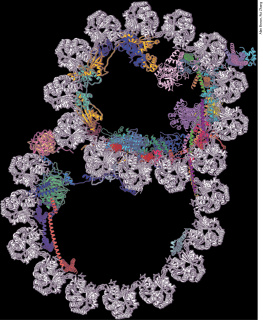Maurice B. Hallett - Molecular and Cellular Biology of Phagocytosis
Here you can read online Maurice B. Hallett - Molecular and Cellular Biology of Phagocytosis full text of the book (entire story) in english for free. Download pdf and epub, get meaning, cover and reviews about this ebook. year: 2020, publisher: Springer International Publishing, genre: Romance novel. Description of the work, (preface) as well as reviews are available. Best literature library LitArk.com created for fans of good reading and offers a wide selection of genres:
Romance novel
Science fiction
Adventure
Detective
Science
History
Home and family
Prose
Art
Politics
Computer
Non-fiction
Religion
Business
Children
Humor
Choose a favorite category and find really read worthwhile books. Enjoy immersion in the world of imagination, feel the emotions of the characters or learn something new for yourself, make an fascinating discovery.
- Book:Molecular and Cellular Biology of Phagocytosis
- Author:
- Publisher:Springer International Publishing
- Genre:
- Year:2020
- Rating:4 / 5
- Favourites:Add to favourites
- Your mark:
- 80
- 1
- 2
- 3
- 4
- 5
Molecular and Cellular Biology of Phagocytosis: summary, description and annotation
We offer to read an annotation, description, summary or preface (depends on what the author of the book "Molecular and Cellular Biology of Phagocytosis" wrote himself). If you haven't found the necessary information about the book — write in the comments, we will try to find it.
Molecular and Cellular Biology of Phagocytosis — read online for free the complete book (whole text) full work
Below is the text of the book, divided by pages. System saving the place of the last page read, allows you to conveniently read the book "Molecular and Cellular Biology of Phagocytosis" online for free, without having to search again every time where you left off. Put a bookmark, and you can go to the page where you finished reading at any time.
Font size:
Interval:
Bookmark:

Advances in Experimental Medicine and Biologyprovides a platform for scientific contributions in the main disciplines of the biomedicine and the life sciences. This series publishes thematic volumes on contemporary research in the areas of microbiology, immunology, neurosciences, biochemistry, biomedical engineering, genetics, physiology, and cancer research. Covering emerging topics and techniques in basic and clinical science, it brings together clinicians and researchers from various fields. provides a platform for scientific contributions in the main disciplines of the biomedicine and the life sciences. This series publishes thematic volumes on contemporary research in the areas of microbiology, immunology, neurosciences, biochemistry, biomedical engineering, genetics, physiology, and cancer research. Covering emerging topics and techniques in basic and clinical science, it brings together clinicians and researchers from various fields.
Advances in Experimental Medicine and Biologyhas been publishing exceptional works in the field for over 40 years, and is indexed in SCOPUS, Medline (PubMed), Journal Citation Reports/Science Edition, Science Citation Index Expanded (SciSearch, Web of Science), EMBASE, BIOSIS, Reaxys, EMBiology, the Chemical Abstracts Service (CAS), and Pathway Studio. has been publishing exceptional works in the field for over 40 years, and is indexed in SCOPUS, Medline (PubMed), Journal Citation Reports/Science Edition, Science Citation Index Expanded (SciSearch, Web of Science), EMBASE, BIOSIS, Reaxys, EMBiology, the Chemical Abstracts Service (CAS), and Pathway Studio.
2018 Impact Factor: 2.126.
More information about this series at http://www.springer.com/series/5584

This Springer imprint is published by the registered company Springer Nature Switzerland AG.
The registered company address is: Gewerbestrasse 11, 6330 Cham, Switzerland
One of the most exciting microscopic events that can be observed in real time is probably phagocytosis. Showing it to anyone who has yet to see it (children, non-scientific adult, scientist from different disciplines, etc.) what happens during phagocytosis is always a stimulating experience. Often while watching, the observer gives encouragement to the cell (Come on! You can do it, Just one more) and may cheer when the phagocyte succeeds (Good cell, youve done it, Great job, etc.) as if the cell were responsive to the words. I guess that it is because in the non-microscopic world, trying to get a dog or a horse do something amazing is rewarded only by encouragement
But consider this. You are given a microscope to view two grey microscopic blobs, with the task of discovering which one of the two is alive. One is a grey blob of gel and the other a living cell. The school-level definitions of life include respiration, growth and excretion. This might not help to distinguish between them. Scientists setting out to discover if there is life on Mars have found this out (distinguishing life from other chemical processes is tricky). You cannot see any substructure in the grey blobs because of the poor optics available. However, you might quickly discover which is the living cell simply by poking each blob with a micropipette. If one of the grey blobs pushes out a pseudopodia at the opposite side to the one you are prodding and then moves away from the irritation, you might immediately guess that it was the living cell. A nonliving blob of gel would not and could not do this. Yet, would a small bag of chemicals do it? A phagocyte , whether a small neutrophil or a large amoeba, is not a dog or a horse to be encouraged; it is instead a bag of chemicals admittedly, a complex bag of chemicals, with substructure (smaller bags within the larger bag), but still a bag of chemicals. When you see this bag appear to think, and decide to grab a smaller object so that you feel it is trying or struggling to grab something, it is mere anthropomorphism. It is just a bag of chemicals. But to see a bag of chemicals do something like phagocytosis, putting out pseudopodia, and holding an object and then proceeding to swallow it, is to see a miracle.Molecular and Cell Biology of Phagocytosisis the study of this miracle.
Font size:
Interval:
Bookmark:
Similar books «Molecular and Cellular Biology of Phagocytosis»
Look at similar books to Molecular and Cellular Biology of Phagocytosis. We have selected literature similar in name and meaning in the hope of providing readers with more options to find new, interesting, not yet read works.
Discussion, reviews of the book Molecular and Cellular Biology of Phagocytosis and just readers' own opinions. Leave your comments, write what you think about the work, its meaning or the main characters. Specify what exactly you liked and what you didn't like, and why you think so.







